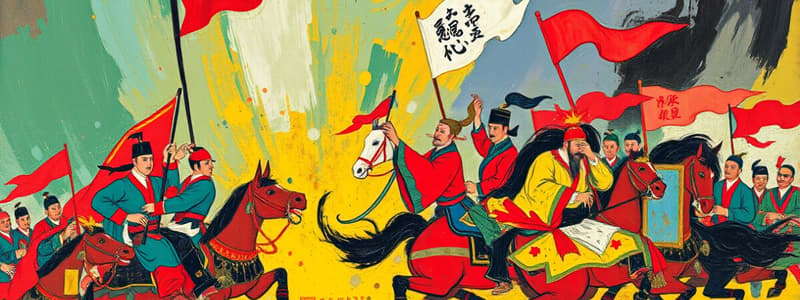Podcast
Questions and Answers
What was the Taiping Rebellion?
What was the Taiping Rebellion?
A massive rebellion between Manchu-led Qing Dynasty and the Christian millenarian movement of Heavenly Kingdom of Peace that lasted for 14 years (1850-64), ruined 17 provinces, and took an estimated 20 million lives.
Why is the Taiping Rebellion considered special?
Why is the Taiping Rebellion considered special?
It challenged the Qing Dynasty and called for social and land reforms, appealing to the lower class population who were increasingly poor.
Who was the founder of the Taiping Rebellion?
Who was the founder of the Taiping Rebellion?
Hong Xiuquan.
What is a brief overview of the Taiping Rebellion's events?
What is a brief overview of the Taiping Rebellion's events?
What was the imperial response to the Taiping Rebellion?
What was the imperial response to the Taiping Rebellion?
What were the general causes of the Taiping Rebellion?
What were the general causes of the Taiping Rebellion?
What were the goals of the Taiping Rebellion?
What were the goals of the Taiping Rebellion?
What are some possible lenses to understand the causes of the Taiping Rebellion?
What are some possible lenses to understand the causes of the Taiping Rebellion?
How did Hong Xiuquan contribute to the Taiping Rebellion?
How did Hong Xiuquan contribute to the Taiping Rebellion?
Flashcards are hidden until you start studying
Study Notes
Taiping Rebellion Overview
- Major conflict between the Qing Dynasty and the Taiping Heavenly Kingdom (1850-1864)
- Estimated to have caused 20 million deaths, impacting 17 provinces
- Initiated by Hong Xiuquan, who claimed divine visions and viewed himself as the brother of Jesus Christ
- Began with 10,000 followers and grew to 1 million by capturing Nanjing in 1854
Significance of the Rebellion
- Challenged the Qing Dynasty's authority, calling for social and land reforms
- Attracted disenfranchised lower classes facing poverty and economic challenges
- Part of a broader pattern of uprisings, including the Nian Rebellion and Muslim revolts
Founder: Hong Xiuquan
- A failed scholar who turned to Christianity after multiple failures in civil service exams
- Created a hybrid belief system combining Christian elements and social reforms
- Visionary leader of the Taiping movement, advocating for social egalitarianism
Course of Events
- Fought primarily in Jiangsu, Zhejiang, Anhui, Jiangxi, and Hubei provinces
- Major confrontations led to over 14 years of conflict, marking one of the bloodiest wars in history
- Taiping forces captured Nanjing on March 19, 1853, proclaiming it their capital
Imperial Response
- Qing government's efforts were largely ineffective; focused on a protracted siege of Nanjing
- Emergence of the Xiang Army under Zeng Guofan, who eventually turned the tide against the Taiping forces
- Initial successes followed by setbacks due to internal conflicts within imperial forces
Causes of the Rebellion
- Series of natural disasters and economic downturns contributing to widespread discontent
- Humiliation from the First Opium War (1842) and subsequent treaties fostered anger against the ruling dynasty
- Overpopulation, rising rents, and tax burdens led to desertion of lands by peasants
Goals of the Rebellion
- Aimed at converting the population to a specific version of Christianity
- Sought to abolish the Manchu ruling class and drastically reform the state
- Intended to overturn existing social and moral order in China
Analytical Lenses for Understanding Causes
- Great Man Theory: Emphasizing the role of Hong Xiuquan and individual agency in the rebellion
- Economic Atrophy: Examining economic decline and its effects on rebellion conditions
- Political Stasis: Investigating the lack of effective governance and reform
- Existing Social Discontent: Analyzing underlying societal grievances driving the revolt
Hong Xiuquan's Role in the Rebellion
- Claimed divine revelation of his identity as Jesus Christ's brother, fueling his mission
- Established the God Following Society in 1843, laying groundwork for the Taiping movement
- Rapidly expanded his army, consolidating power and leading to rebellion by 1850
Studying That Suits You
Use AI to generate personalized quizzes and flashcards to suit your learning preferences.





